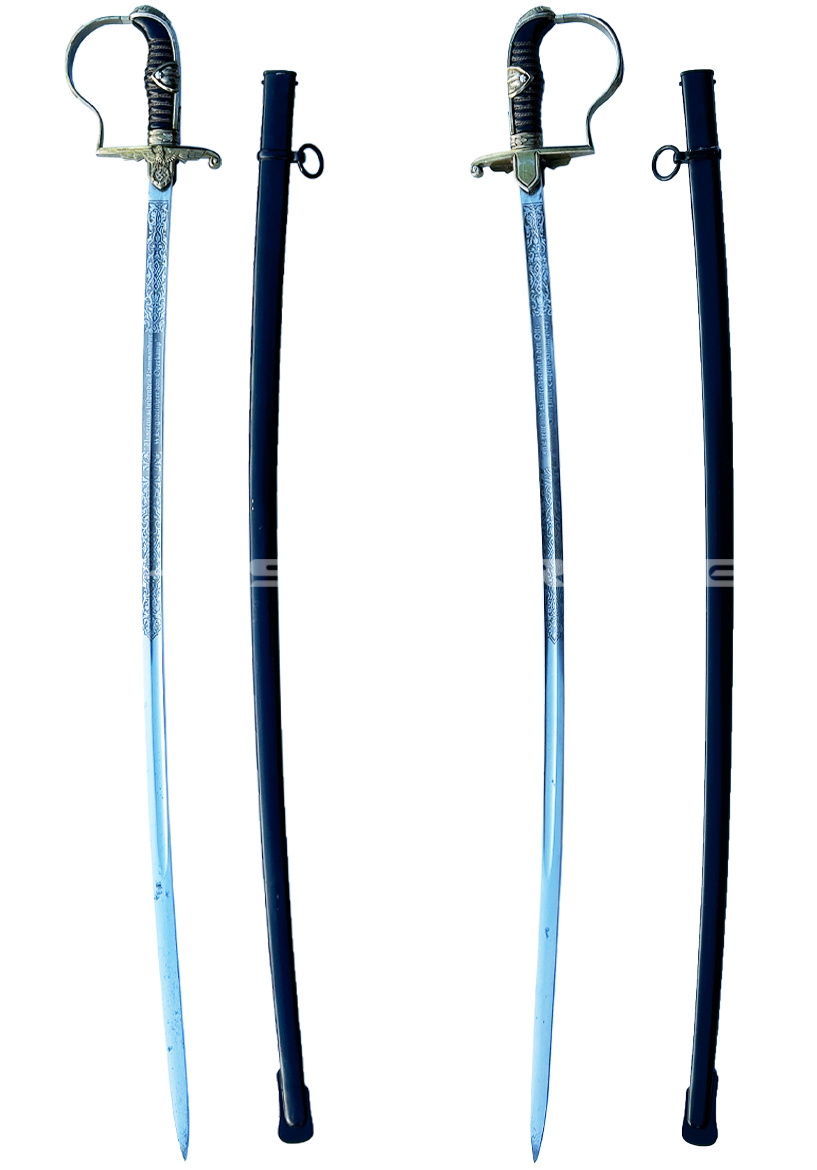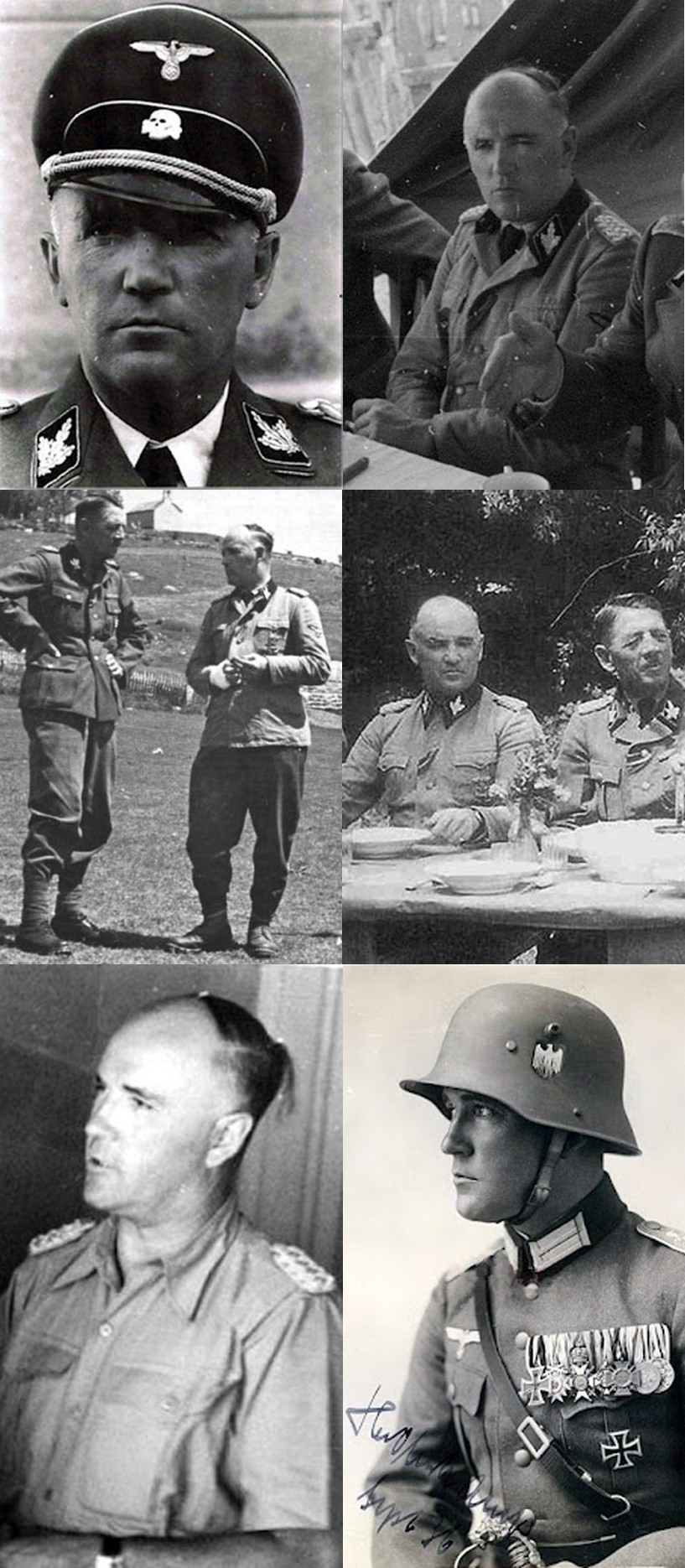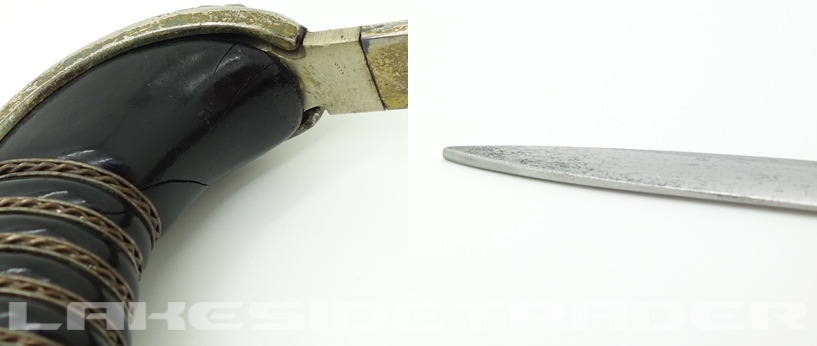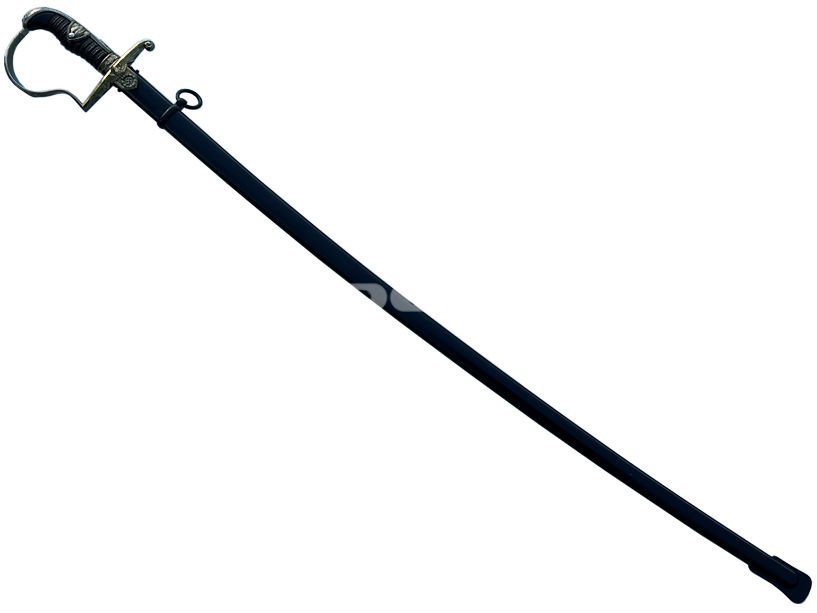General Carl von Oberkamp’s SS Prinz Eugen Sword
Carl (Karl) Ferdinand Joseph Ritter von Oberkamp (October 30, 1893 - 4 May 4, 1947) was a General (SS-Brigadeführer und Generalmajor der Waffen-SS – January 30, 1943) in command of the SS Prinz Eugen Division (7. SS-Freiwilligen-Gebirgs-Division Prinz Eugen) from May 15, 1943 to January 30, 1944. His SS Number is: 310 306 and His NSDAP Number is: 1 928 904.
Pre-1933
The name “von Oberkamp” was registered in the Knight class of Nobility in Bavaria in 1813. In WWI, Carl served as a platoon leader in the battle of Lorraine and later at the Somme. During the Nazi upsizing Karl participated in the Hitler Putsch in 1923. From 1922-31, he worked as a ski instructor and a mountain guide, in Germany, Austria, and Switzerland.
1933-1945
He officially joined the NSDAP on May 1, 1933. Gave his 1 year service to the RAD, joined the SA May 6, 1934 to March 1, 1935, when he joined the Army. He participated in the Austrian Anschulss in 1938. He jointhe the SS-VT on June 1, 1939. He participated in the invasion of Poland September 1, 1939. In 1940, he was a battalion commander and participated in the Western Campaign. In 1941, he participated in the invasion of Russia. In 1942, he was transferred to the SS Main Command office where he was a Chief Inspector until April 1943.
Karl was transferred to the 7th SS Mountain Division “Prinz Eugen” as SS Brigadeführer. Under his command, the division committed numerous war crimes; shortly after he took up his duties, members of the 1st SS Mountain Jäger Regiment shot 40 civilians in the village of Košutica near Sokolac on July 12, 1943.
After attacks against Croatian Muslims by the division, a heated argument broke out between Oberkamp and Konstantin Kammerhofer (Representative of the Reichsführer SS to the Commander of the German Troops in Croatia), whereupon Heinrich Himmler commissioned SS-Obergruppenführer Artur Phleps, Commander of the V. SS Volunteer Mountain Corps, to investigate the incidents and asked him to “take Oberkamp, who had long been known for his difficult nature, very firmly in hand.” Oberkamp later ordered that children under 14 and women should only be shot in combat or by court martial. During the rest of the year, the division took part in the disarmament of Italian units and the fight against Tito partisans as part of “Operation Autumn Thunderstorm”, continually committing shootings, looting and other atrocities.
After Oberkamp was temporarily represented by Standartenführer August Schmidhuber due to illness, he returned to the division in January 1944, but was replaced by Oberführer Otto Kumm in the same month after disputes arose between him and Phleps, whereupon Himmler warned him to “fundamentally change his ways.”
From February 1 to 20, 1944, Oberkamp served in the SS Main Leadership Office and was subsequently appointed commandant of the SS military training area Moorlager. On May 4, 1944, he was replaced and returned to the SS Main Leadership Office, where he again held various positions as inspector.
Post-1945
At the end of the war, Oberkamp was captured by the Americans and extradited to Yugoslavia , where he was sentenced to death by a military tribunal for the crimes committed under his responsibility and hanged in Belgrade on May 4, 1947.
Awards:
- Iron Cross (1914) II. and I. Class on 19 September 1914 and 6 July 1916
- Knight's Cross 2nd Class with Swords of the Ducal Saxe-Ernestine House Order on 1 March 1915
- German Reich Sports Badge in Silver
- SA Sports Badge in Bronze, Silver and Gold - (I believe he was a sports instructor)
- Cross of Honor for Frontline Fighters on 1 April 1935
- Wehrmacht Long Service Award 4th Class on 2 October 1936
- Repeat clasps (1939) for the Iron Cross (1914) I. and II. Class on 22 September 1939 and 10 July 1940
- Army Mountain Guide Badge
- Honorary Sword of the Reichsführer SS
- SS Honor Ring
- SS Julleuchter
Dates of Rank:
- Fahnenjunker: 6 July 1912
- Leutnant: 18 February 1914
- Oberleutnant: 18 April 1917
- Hauptmann: 1 September 1935
- Major: 16 January 1937
- SS-Sturmbannführer:
- SS-Obersturmbannführer:
- SS-Standartenführer:
- SS-Oberführer:
- SS-Brigadeführer und Generalmajor der Waffen-SS: 30 January 1943
The sword is Carl Eickhorn’s Prinz Eugen Model 1765 It was introduced in August 1939, as a part of Eichorn’s Field Marshal series. Wittmann writes about this model specifying that “… it was also easy to assume this must have been an SS version, certainly carried by members of the Waffen-SS division Prinz Eugen.” (p.339). John Angolia also features in “Swords of Hitler’s Third Reich” an SS officer wearing a Prinz Eugen Sword stating: “Most probably officers of the SS Division Prinz Eugen gained permission for their officers to officially wear the sword pattern ‘Prinz Eugen’ as it lauded the name of the Divisions’ namesake.”
The 32 ¼ inch long blade on this one looks excellent. It is properly stamped “Original Eickhorn Solingen” behind the langet. The dark and crip etching on this one is gorgeous and what really makes this piece. The obverse reads: “Unserem Scheidenden Kommander SS Brigadefuhrer von Oberkamp” (To our departing commander SS-Brigadeführer von Oberkamp) flanked by a floral leaf motif. The reverse reads: “In Treue und Kameradschaft v. den Offz. der Gebirs Div. Prinz Eugen, January 1944” (In Loyalty and Comradeship of the Officer of the Mountain Division Prinz Eugen, January 1944). It rates Exc++/NM. The tip has been slightly re-shaped, it shows minor scratches and age grey spotting throughout. The original blackened leather buffer pad remains intact. The sheet metal based black painted scabbard on this on looks great. It shows some spidering and minor scratches throughout. It remains completely dent free. Both throat retaining screws remain intact. The p-guard hilt on this one is gorgeous. Textbook white metal with the gold-green plated finish. The Paul Casberg-designed eagle on the crossguard is gorgeous. The guard and back strap feature prominent oak leaves throughout. The top features the German National Eagle. The top of the p-guard has a period repair with a personalized etched Iron Cross. The grip is wood based and covered in a black bakelite. There are minor chips where the repair was. The triple wire wrap is tightly intact. Overall, this is a historically significant piece sure to please. Given the history, it is my opinion that this was given to Oberkamp as a peace offering from Himmler…
| Rating: | Exc++ |
| Item Number: | SW-39899 |










If you would like to purchase this item, please Create an Account, add it to Your Cart and Checkout.
We would recommend that you read our Policies page before making a purchase.



